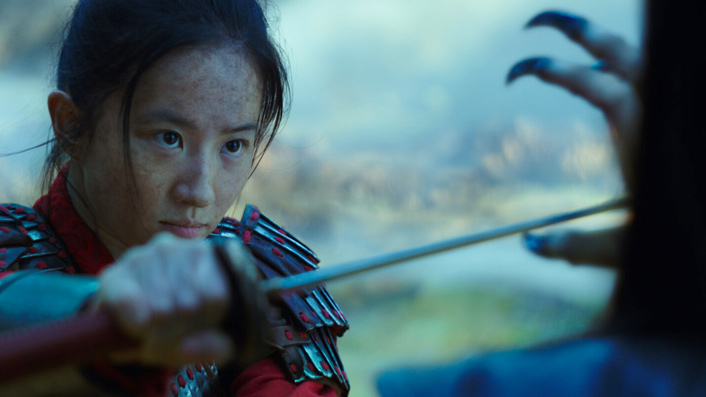Mulan is a visually arresting epic with serviceable fight choreography

The live-action Mulan remake has arrived on Disney+, available to view for an additional $34.99. It’s not going to set your pants on fire—but at least it’s visually arresting, writes critic Aaron Yap.
Disney’s $300 million live-action adaptation of their 1998 animated hit Mulan has landed—in my bedroom, and that’s okay. Understandably, it’ll be difficult for some viewers to extricate the final product from the swirling cloud of politically-charged controversy and circumstance that’s plagued it for months. That’s okay too.
See also:
* Best new movies and TV arriving on Disney+ this month
* All new shows & movies now streaming
If the reservation is around the decision to dump a blockbuster of this scale onto a streaming platform on Day One—well, from this viewer’s standpoint, it quickly dissipated. It’s possible that the finer details of Grant Major’s intricately layered production design cannot fully be appreciated on telly. But there’s also the realisation that we’re now all so accustomed to experiencing costly HBO spectacle like Games of Thrones at home—or on the bus—that it feels just… normal.
The film itself is an eminently watchable, meticulously mounted period adventure that’s good enough for you to wish that it was a little better. It could do with harnessing more of the daring exhibited by its titular, gender-switching heroine. For better or worse, Mulan is a Disney movie, on-brand with broadly universal themes that’ll slot in comfortably with any of their classic fairy tales or Star Wars instalments despite its Chinese folklore origins.
It’s exactly what you’d imagine a Mouse House wu xia pic might be: turning up to the party as handsomely crafted as money can buy, but lacking the innate poetic grace and artistry of a King Hu or Zhang Yimou epic. And like most of their recent live-action adaptations, the film flattens out the imaginative quirkiness of their animated counterparts in pursuit of grittier realism. You won’t find characters suddenly bursting into song, nor a cute cricket sidekick with a knack for inking Chinese calligraphy here.
Occasionally when it does veer into cartoonish slapstick—such as the recreation of the original’s match-making scene—the effect can be slightly jarring, given the overridingly serious tone. Fortunately, it remains a visually arresting entertainment, with Mandy Walker’s cinematography soaking the costumes, sets and locations in an almost-psychedelic vibrancy that would pop off any screen regardless of size. The fight choreography is serviceable, not shredded to bits but also apparent there’s room for refinement and innovation. A pivotal set-piece like the climactic showdown between antagonist Bori Khan (Jason Scott Lee) and Mulan on top of wooden scaffolding could have used a touch of Tsui Hark’s resourceful creativity to make it really hum.
The cast is phenomenally stacked with veteran Chinese talent—including Shaw Brothers icon Chen Pei-pei in a small part, and a rather unrecognisable Jet Li—but only a few manage to leave an impression in such a crowded space (the film’s fleet pacing doesn’t afford sufficient screen time either). Tzi Ma is heart-breaking as Mulan’s disabled father, while Gong Li’s shape-shifting witch Xian Lang, a new character addition, provides a nuanced presence missing elsewhere in the film.
Reminiscent of Zhang Ziyi, Liu Yifei’s steely, duty-bound magnetism carries her through the action capably—dodging and shooting arrows, back-flipping on horses, riding into battle—although one can’t help but wish for a more compelling personality. As it stands, her Mulan succeeds insofar as being an exquisitely constructed porcelain vessel for the story’s themes of courage, honor, loyalty and female empowerment.

















